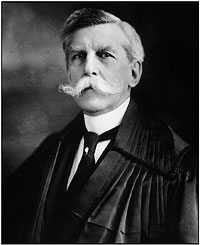 |
| Just One Generation of Supreme Court Imbeciles |
Nazi doctors claimed that their crimes could not be crimes because their actions mirrored those carried out in the United States, and those done there were carried out with the approval of the United States Supreme Court.
Could that be the case? Could the United States have provided the sick inspiration for the medical crimes of Nazi Germany. Unfortunately for us, the Nazis were right.
The case was Buck v. Bell.
Carrie Buck, a Virginian, resided at a State institution for the feeble minded. There, by state law, she was subject to involuntary sterilization under a Virginia eugenics law intended to prevent procreation by feeble mindeds, incompetents, and other genetically "undesirable" populations. "[Carrie wa]s the daughter of a feeble minded mother in the same institution, and the mother of an illegitimate feeble minded child." The court below found that Buck was
the probable potential parent of socially inadequate offspring, likewise afflicted, that she may be sexually sterilized without detriment to her general health, and that her welfare and that of society will be promoted by her sterilization[.]
I take a caution here. This statement is not Justice Holmes' for the Court, but a quotation from the Virginia court that denied Carrie's requested order protecting her from involuntary sterilization.
Justice Holmes, as I mentioned in discussing Harry Blackmun above, had concerns about substantive due process being a tool by which substantial accretions of power were being deposited with the Court over time. As in other cases where he was loathe to reject State laws based on the discovery of newly identified substantive rights within the Due Process Clause of the Fourteenth Amendment, Justice Holmes rejected Buck's attempt to attack the Virginia Eugenic Sterilization Act on the ground of a substantive right to be free from State imposition on her ability to procreate.
In his brief discourse rejecting Buck's claim, Justice Holmes penned one of the most disturbing, startling paragraphs on the power of the State and the justifications for its actions:
It is no wonder that Nazi doctors invoked Holmes' reasoning to try (unsuccessfully) to avoid conviction for their identical program of forced sterilization. One might say, three generations of imbecilic Supreme Court opinions is enough.
Justice Holmes, as I mentioned in discussing Harry Blackmun above, had concerns about substantive due process being a tool by which substantial accretions of power were being deposited with the Court over time. As in other cases where he was loathe to reject State laws based on the discovery of newly identified substantive rights within the Due Process Clause of the Fourteenth Amendment, Justice Holmes rejected Buck's attempt to attack the Virginia Eugenic Sterilization Act on the ground of a substantive right to be free from State imposition on her ability to procreate.
In his brief discourse rejecting Buck's claim, Justice Holmes penned one of the most disturbing, startling paragraphs on the power of the State and the justifications for its actions:
We have seen more than once that the public welfare may call upon the best citizens for their lives. It would be strange if it could not call upon those who already sap the strength of the State for these lesser sacrifices, often not felt to be such by those concerned, in order to prevent our being swamped with incompetence. It is better for all the world if, instead of waiting to execute degenerate offspring for crime or to let them starve for their imbecility, society can prevent those who are manifestly unfit from continuing their kind. The principle that sustains compulsory vaccination is broad enough to cover cutting the Fallopian tubes. [] Three generations of imbeciles are enough.In essence, Justice Holmes concluded that, because society chooses to create a social safety net, it can impose "smaller sacrifices" on those that fall into the net. Such a principle, once articulated, has no obvious limits.
It is no wonder that Nazi doctors invoked Holmes' reasoning to try (unsuccessfully) to avoid conviction for their identical program of forced sterilization. One might say, three generations of imbecilic Supreme Court opinions is enough.